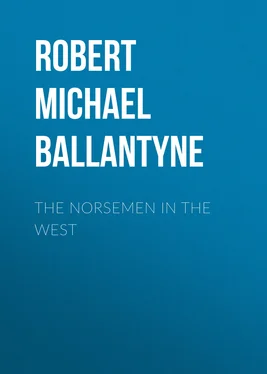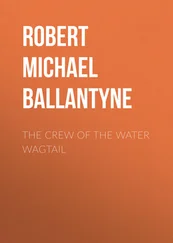Robert Michael Ballantyne - The Norsemen in the West
Здесь есть возможность читать онлайн «Robert Michael Ballantyne - The Norsemen in the West» — ознакомительный отрывок электронной книги совершенно бесплатно, а после прочтения отрывка купить полную версию. В некоторых случаях можно слушать аудио, скачать через торрент в формате fb2 и присутствует краткое содержание. Жанр: Детские приключения, literature_19, foreign_antique, foreign_prose, foreign_children, на английском языке. Описание произведения, (предисловие) а так же отзывы посетителей доступны на портале библиотеки ЛибКат.
- Название:The Norsemen in the West
- Автор:
- Жанр:
- Год:неизвестен
- ISBN:нет данных
- Рейтинг книги:5 / 5. Голосов: 1
-
Избранное:Добавить в избранное
- Отзывы:
-
Ваша оценка:
- 100
- 1
- 2
- 3
- 4
- 5
The Norsemen in the West: краткое содержание, описание и аннотация
Предлагаем к чтению аннотацию, описание, краткое содержание или предисловие (зависит от того, что написал сам автор книги «The Norsemen in the West»). Если вы не нашли необходимую информацию о книге — напишите в комментариях, мы постараемся отыскать её.
The Norsemen in the West — читать онлайн ознакомительный отрывок
Ниже представлен текст книги, разбитый по страницам. Система сохранения места последней прочитанной страницы, позволяет с удобством читать онлайн бесплатно книгу «The Norsemen in the West», без необходимости каждый раз заново искать на чём Вы остановились. Поставьте закладку, и сможете в любой момент перейти на страницу, на которой закончили чтение.
Интервал:
Закладка:
“Now,” said Karlsefin, at the conclusion of one of his stories, “that is the saga of Halfdan the Black—at least it is part of his saga; but, friends, it seems to me that we must begin a saga of our own, for it is evident that if we are successful in this venture we shall have something to relate when we return to Greenland, and we must all learn to tell our saga in the same words, for that is the only way in which truth can be handed down to future generations, seeing that when men are careless in learning the truth they are apt to distort it so that honest men are led into telling lies unwittingly. They say that the nations of the south have invented a process whereby with a sharp-pointed tool they fashion marks on skins to represent words, so that once put down in this way a saga never changes. Would that we Norsemen understood that process!” said Karlsefin meditatively.
“It seems to me,” said Biarne, who reclined on the deck, leaning against the weather-bulwarks and running his fingers playfully through Olaf’s fair curls, “It seems to me that it were better to bestow the craft of the skald on the record of our voyage, for then the measure and the rhyme would chain men to the words, and so to the truth—that is, supposing they get truth to start with! Come, Karlsefin, begin our voyage for us.”
All present seemed to agree to that proposal, and urged Karlsefin to begin at once.
The skipper—for such indeed was his position in the ship—though a modest man, was by no means bashful, therefore, after looking round upon the moonlit sea for a few minutes, he began as follows:—
“When western waves were all unknown,
And western fields were all unsown,
When Iceland was the outmost bound
That roving viking-keels had found—
Gunbiorn then—Ulf Kraka’s son—
Still farther west was forced to run
By furious gales, and there saw land
Stretching abroad on either hand.
Eric of Iceland, called the Red,
Heard of the news and straightway said—
‘This western land I’ll go and see;
Three summers hence look out for me.’
He went; he landed; stayed awhile,
And wintered first on ‘Eric’s Isle;’
Then searched the coast both far and wide,
Then back to Iceland o’er the tide.
‘A wondrous land is this,’ said he,
And called it Greenland of the sea.
Twenty and five great ships sailed west
To claim this gem on Ocean’s breast.
With man and woman, horn and hoof,
And bigging for the homestead roof.
Some turnèd back—in heart but mice—
Some sank amid the Northern ice.
Half reached the land, in much distress,
At Ericsfiord and Heriulfness.
Next, Biarne—Heriulf’s doughty son—
Sought to trace out the aged one. (His father.)
From Norway sailed, but missed his mark;
Passed snow-topped Greenland in the dark;
And came then to a new-found land—
But did not touch the tempting strand;
For winter winds oppressed him sore
And kept him from his father’s shore.
Then Leif, the son of Eric, rose
And straightway off to Biarne goes,
Buys up his ship, takes all his men,
Fares forth to seek that land again.
Leif found the land; discovered more,
And spent a winter on the shore;
Cut trees and grain to load the ship,
And pay them for the lengthened trip.
Named ‘Hella-land’ and ‘Markland’ too,
And saw an island sweet with dew!
And grapes in great abundance found,
So named it Vinland all around.
But after that forsook the shore,
And north again for Greenland bore.
And now—we cross the moonlit seas
To search this land of grapes and trees
Biarne, Thorward, Karlsefin—
Go forth this better land to win,
With men and cattle not a few,
And household gear and weapons too;
And, best of all, with women dear,
To comfort, counsel, check, and cheer.
Thus far we’ve made a prosp’rous way,
God speed us onward every day!”
They all agreed that this was a true account of the discovery of Vinland and of their own expedition as far as it had gone, though Gudrid said it was short, and Freydissa was of opinion that there was very little in it.
“But hold!” exclaimed Biarne, suddenly raising himself on his elbows; “Karlsefin, you are but a sorry skald after all.”
“How so?” asked the skipper.
“Why, because you have made no mention of the chief part of our voyage.”
“And pray what may that be?”
“Stay, I too am a skald; I will tell you.”
Biarne, whose poetical powers were not of the highest type, here stretched forth his hand and said:—
“When Biarne, Thorward, Karlsefin,
This famous voyage did begin,
They stood upon the deck one night,
And there beheld a moving sight.
It made the very men grow pale,
Their shudder almost rent the sail!
For lo! they saw a mighty whale!
It drew a shriek from Olaf brave,
Then plunged beneath the briny wave,
And, while the women loudly shouted,
Up came its blundering nose and spouted.
Then underneath our keel it went,
And glared with savage fury pent,
And round about the ship it swum,
Striking each man and woman dumb.
Stay—one there was who found a tongue
And still retained her strength of lung.
Freydissa, beauteous matron bold,
Resolved to give that whale a scold!
But little cared that monster fish
To gratify Freydissa’s wish;
He shook his tail, that naughty whale,
And flourished it like any flail,
And, ho! for Vinland he made sail!”
“Now, friends, was not that a great omission on the part of Karlsefin?”
“If the whale had brought his flail down on your pate it would have served you right, Biarne,” said Freydissa, flushing, yet smiling in spite of herself.
“I think it is capital,” cried Olaf, clapping his hands—“quite as good as the other poem.”
Some agreed with Olaf, and some thought that it was not quite in keeping with Karlsefin’s composition, but, after much debate, it was finally ruled that it should be added thereto as part and parcel of the great Vinland poem. Hence it appears in this chronicle, and forms an interesting instance of the way in which men, for the sake of humorous effect, mingle little pieces of fiction with veritable history.
By the time this important matter was settled it was getting so late that even the most enthusiastic admirer among them of moonlight on a calm sea became irresistibly desirous of going to sleep. They therefore broke up for the night; the women retired to their cabin, and none were left on deck except the steersman and the watch. Long before this the saga-tellers on the forecastle had retired; the monotone and the soft lowing of the cattle had ceased; man and beast had sought and found repose, and nothing was heard save the ripple of the water on the ship’s sides as she glided slowly but steadily over the sleeping sea.
Chapter Six.
Changes in Wind and Weather Produce Changes in Temper and Feeling—Land Discovered, and Freydissa Becomes Inquisitive
There are few things that impress one more at sea than the rapidity of the transitions which frequently take place in the aspect and the condition of vessel, sea, and sky. At one time all may be profoundly tranquil on board; then, perhaps, the necessity for going “about ship” arises, and all is bustle; ropes rattle, blocks clatter and chirp, yards creak, and seamen’s feet stamp on the deck, while their voices aid their hands in the hauling of ropes; and soon all is quiet as before. Or, perhaps, the transition is effected by a squall, and it becomes more thorough and lasting. One moment everything in nature is hushed under the influence of what is appropriately enough termed a “dead calm.” In a few seconds a cloud-bank appears on the horizon and one or two cats-paws are seen shooting over the water. A few minutes more and the sky is clouded, the glassy sea is ruffled, the pleasant light sinks into a dull leaden grey, the wind whistles over the ocean, and we are—as far as feeling is concerned—transported into another, but by no means a better, world.
Читать дальшеИнтервал:
Закладка:
Похожие книги на «The Norsemen in the West»
Представляем Вашему вниманию похожие книги на «The Norsemen in the West» списком для выбора. Мы отобрали схожую по названию и смыслу литературу в надежде предоставить читателям больше вариантов отыскать новые, интересные, ещё непрочитанные произведения.
Обсуждение, отзывы о книге «The Norsemen in the West» и просто собственные мнения читателей. Оставьте ваши комментарии, напишите, что Вы думаете о произведении, его смысле или главных героях. Укажите что конкретно понравилось, а что нет, и почему Вы так считаете.












